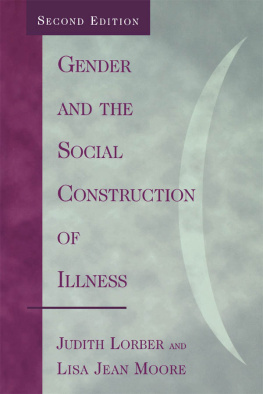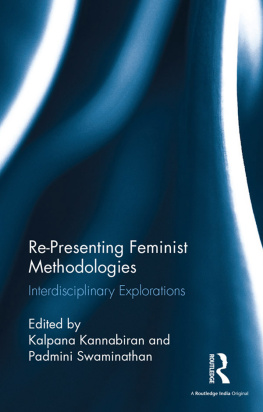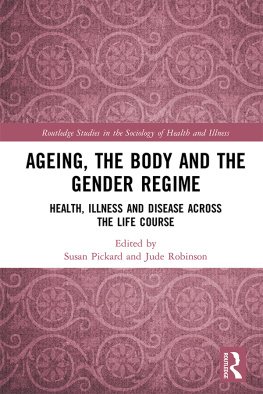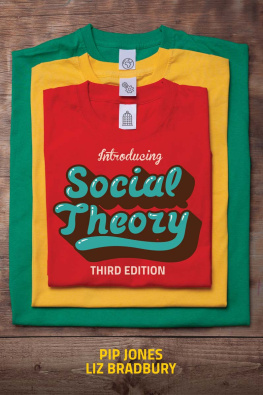Gender and the Social
Construction of Illness
THE GENDER LENS SERIES
Series Editors
Judith A. Howard
University of Washington
Barbara Risman
North Carolina State University
Joey Sprague
University of Kansas
The Gender Lens Series has been conceptualized as a way of encouraging the development of a sociological understanding of gender. A gender lens means working to make gender visible in social phenomena; asking if, how, and why social processes, standards, and opportunities differ systematically for women and men. It also means recognizing that gender inequality is inextricably braided with other systems of inequality. The Gender Lens series is committed to social change directed toward eradicating these inequalities. Originally published by Sage Publications and Pine Forge Press, all Gender Lens books are now available from AltaMira Press.
BOOKS IN THE SERIES
Yen Le Espiritu, Asian American Women and Men: Labor, Laws, and Love
Judith A. Howard and Jocelyn A. Hollander, Gendered Situations, Gendered Selves: A Gender Lens on Social Psychology
Michael A. Messner, Politics of Masculinities: Men in Movements
Judith Lorber and Lisa Jean Moore, Gender and the Social Construction of Illness, Second Edition
Scott Coltrane, Gender and Families
Myra Marx Ferree, Judith Lorber, and Beth B. Hess, editors, Revisioning Gender
Pepper Schwartz and Virginia Rutter, The Gender of Sexuality: Exploring Sexual Possibilities
Francesca M. Cancian and Stacey J. Oliker, Caring and Gender
M. Bahati Kuumba, Gender and Social Movements
Toni M. Calasanti and Kathleen F. Slevin, Gender, Social Inequalities, and Aging

Gender and the Social
Construction of Illness

Second Edition
Judith Lorber and Lisa Jean Moore

ALTAMIRA PRESS
A division of Rowman & Littlefield Publishers, Inc.
A wholly owned subsidiary of The Rowman & Littlefield Publishing Group, Inc.
4501 Forbes Boulevard, Suite 200
Lanham, MD 20706
www.altamirapress.com
Estover Road
Plymouth PL6 7PY
United Kingdom
Copyright 2002 by AltaMira Press
All rights reserved. No part of this publication may be reproduced, stored in a retrieval system, or transmitted in any form or by any means, electronic, mechanical, photocopying, recording, or otherwise, without the prior permission of the publisher.
British Library Cataloguing in Publication Information Available
Library of Congress Cataloging-in-Publication Data
Lorber, Judith.
Gender and the social construction of illness / Judith Lorber and Lisa Jean Moore.2nd ed.
p. cm.(The gender lens series)
Includes bibliographical references and index.
ISBN: 978-0-7591-0238-5
1. Social medicine. 2. WomenHealth and hygiene. 3. Sexism in medicine. I. Moore, Lisa Jean, 1967II. Title. III. Gender lens.
RA418 .L67 2002
306.461dc21
2002003798
Printed in the United States of America
 The paper used in this publication meets the minimum requirements of American National Standard for Information SciencesPermanence of Paper for Printed Library Materials, ANSI/NISO Z39.481992.
The paper used in this publication meets the minimum requirements of American National Standard for Information SciencesPermanence of Paper for Printed Library Materials, ANSI/NISO Z39.481992.
For Lorrie and Phyllis,
who have gone through life with Judith
For Grace and Georgia,
who begin life with Lisa

CONTENTS

SERIES EDITORS FOREWORD
The current volume is the second edition of Gender and the Social Construction of Illness. Judith Lorber and Lisa Jean Moore present a gendered analysis of health, illness, and medical care. This volume is thoroughly updated, and adds chapters on disability and genital surgery. Judith Lorber and Lisa Jean Moore use familiar concepts in medical sociology reconceptualized through a gender lens. Like the first edition, the current volume addresses two basic issues. First, the authors pay critical attention to the social aspects of the experience of physical illness and resultant medical care. This involves attention to how gender, race, class, ethnicity, and culture influence the experience of symptoms and how such symptoms are treated by the medical establishment. Second, the authors use a gender lens to critically examine the social construction of the knowledge base and underlying assumptions about illness. They critique the way questions are asked and research priorities set.
Although medical sociologists have addressed these issues in the past, they have usually done so without a gender lens. For medical sociologists, gender has meant womenfirst, patients and nurses, and then doctors. When medical sociologists have added women to research it has usually meant comparing womens and mens sickness and death rates, differences in behavior and in treatment as patients, behaviors as doctors, and so on. But much of the analysis of the social construction of medical knowledge and beliefs did not incorporate a concern with the social construction of gender.
For feminists who study health and illness, attention to gender has meant concern with the status of women and men in the social order. Feminists have asked why, how, and by whom such normal physiological events as menstruation and menopause have been turned into illnesses and consequently into social problems. They have looked at the gendered dimensions of the hierarchy of medical occupations and what happens when men are nurses and women are doctors. Feminists have also questioned the objectivity and neutrality of scientific findings that come out of a professional world dominated by men.
In this volume, Judith Lorber and Lisa Jean Moore weave together medical, sociological, and feminist concerns as they take a gender lens on health, illness, and medicine. Lorber and Moore show how gender is an integral part of the transformation of physiologyrates of illness and longevityand provide data for the proposition that these are the results of social statusesrace, class, and gender. Premenstrual tension and menopause are discussed at length as examples of the processes by which normal physiological female phenomena become illnesses that denigrate womens social status. Lorber and Moore provide an in-depth look at the current AIDS epidemic. The book ends with a proposal for leveling the hierarchies and inequalities in medicine through feminist health care practices and suggests that this would be beneficial for men as well as for women.
We hope this book, and others in the Gender Lens series, will help the reader develop her or his own gender lens to better and more accurately understand our social environments. As sociologists, we believe that an accurate understanding of inequality is a prerequisite for effective social change.
Next page













 The paper used in this publication meets the minimum requirements of American National Standard for Information SciencesPermanence of Paper for Printed Library Materials, ANSI/NISO Z39.481992.
The paper used in this publication meets the minimum requirements of American National Standard for Information SciencesPermanence of Paper for Printed Library Materials, ANSI/NISO Z39.481992.